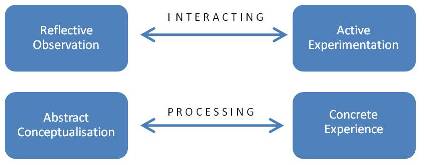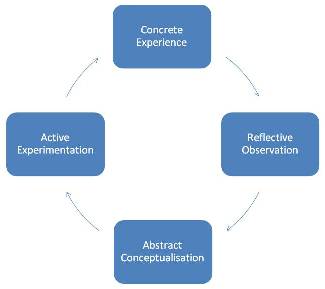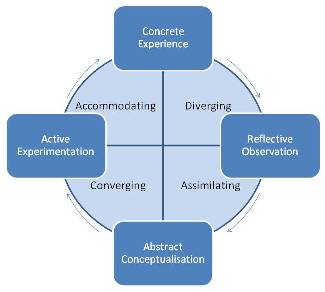
|
Kolb
Let's take a look at Kolb's model of learning. A multitude of different sins are taught on paddlesport coaching courses under Kolb's name, some of which Kolb certainly wouldn't recognise as his own.

|
Kolb's model says we vary in the way that we interact with the world;
- Some like to get in there and play (active experimentation)
- Others prefer to stand back (reflective observation).
It also says we differ in the way we process these interactions; - Some people like to head off on theoretical flights of fancy (abstract conceptualisation)
- Others remain firmly grounded in what happened (concrete experience).
|
|
Kolb states that these four processes form a cycle by which experiential learning occurs. For the learning to be effective, we'll need to do each of these sequentially. This is the foundation of what is more usually taught as "plan, do, review".
|

|
 |
Moreover Kolb states that we'll each have a preference as to how we like to interact with the world and how we like to process what we've discovered e.g. I might be like to interact by active experimentation, but process my experiences by abstract conceptualisation.
Thus Kolb comes up with four possible learning styles (accomodating, assimilating, converging, diverging). These don't often get taught, although they clearly pay more than a passing resemblance to Honey and Mumford's TARP learning preferences.
|
I've seen Kolb's learning cycle taught with, Honey and Mumford's learning styles labels and VAK scribbled over the top of it. Thus three broadly similar, but subtly contradictory models of learning are combined inside a new coach's head and we're surprised when they get confused!
As with TARP and VAK, there's plenty of literature out there both for and against assigning one of Kolb's four learning styles to your students and teaching them accordingly. (3) pg 69-79.
I don't think that's how it's introduced on paddlesport courses, nor how it's used by most coaches though.
I suspect it's usually introduced in the guise of "plan, do, review".
I'm not aware of any evidence from neuroscience that this reflects how experiential learning actually occurs, nor can I find any studies that describe how our use of "plan, do, review" in our coaching affects the perfomance of our learners.
As a "dwarves and giants" type fact, it if it encourages us as boaters and coaches to reflect on our experiences, and moves us on if we're bogged down in any particular part of the cycle, I find it hard to see how it can do much harm.
|



